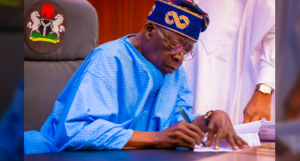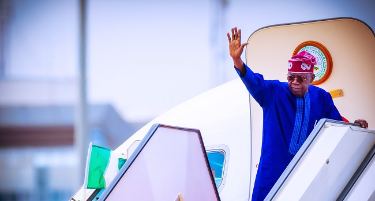President Bola Ahmed Tinubu is set to depart Abuja on Thursday, May 23, for N’Djamena, the capital of the Republic of Chad, where he will attend the inauguration ceremony of President Idriss Mahamat Déby Itno. This event follows the recent declaration of Déby as the winner of Chad’s presidential election earlier this month, a victory subsequently confirmed by the country’s Constitutional Court.
The announcement of President Tinubu’s trip was made by his spokesman, Ajuri Ngelale, who indicated that Tinubu will be accompanied by a delegation of senior government officials. The Nigerian president is expected to return to Abuja following the conclusion of the inauguration ceremony.
President Déby, who leads Chad’s military junta, secured a decisive victory in the May 6 presidential election, garnering 61 percent of the vote according to the final results. The Constitutional Council of Chad not only confirmed these results but also dismissed an appeal by Prime Minister Succes Masra to annul the election. Masra, who had declared himself the rightful victor, expressed his disagreement with the results in a social media post, yet acknowledged there were no further legal avenues available to challenge the outcome. He urged his supporters to stay “mobilised” while remaining “peaceful.”
The election was called by Déby to conclude three years of military rule in Chad, a nation strategically important in the battle against jihadism in Africa’s volatile Sahel region. Despite the significant win, Déby has yet to make any immediate public comments following his official proclamation as the winner. However, after the release of the provisional results on May 9, he proclaimed himself as “the elected president of all Chadians” and committed to fulfilling his promises to the nation.
Déby’s victory was anticipated by many observers, who predicted a commanding win for the 40-year-old leader. His primary rival, Succes Masra, an economist also aged 40, managed to secure 18.5 percent of the vote, while former Prime Minister Albert Pahimi Padacke received 16.9 percent. The announcement was made by Constitutional Council President Jean-Bernard Padare. Déby and Masra faced competition from eight other candidates, most of whom were either relatively unknown or perceived as non-threatening to the regime.

The electoral campaign witnessed an unexpected surge in support for Masra, who attracted large crowds and claimed that he had a real chance of either winning or forcing Déby into a second round of voting. This support came as a surprise in a country long dominated by coups, authoritarian rule, and rebel insurgencies since its independence from France in 1960.
Idriss Mahamat Déby Itno ascended to the position of transitional president in 2021, following the assassination of his father, Idriss Déby Itno, by rebel forces. The younger Déby initially pledged an 18-month transition towards democracy, a timeline he later extended by two years.
As President Tinubu prepares to attend the inauguration, this event marks a significant moment in Chad’s political landscape, potentially setting the stage for future developments in the country’s quest for stability and democratic governance.




